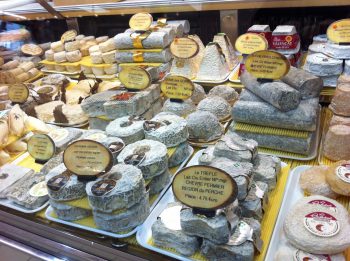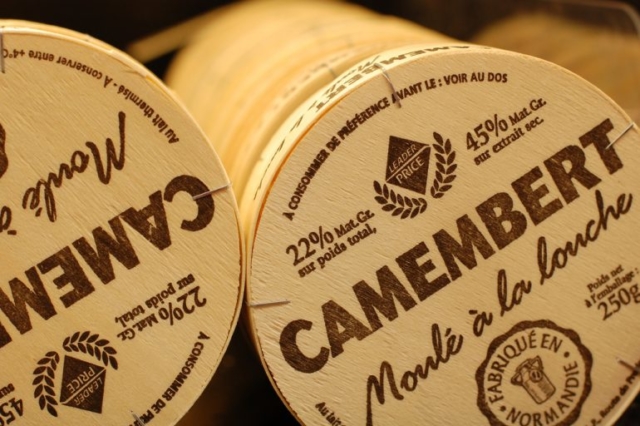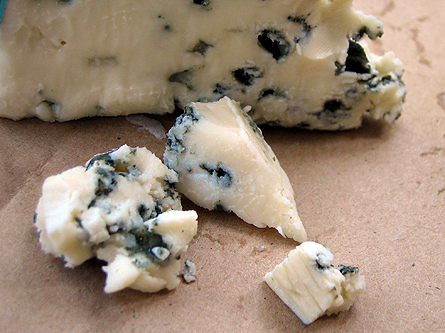
Why does French cheese have such a bad reputation in many parts of the world? Are people put off by its potent smell or high fat content? Do they assume French cheese is a bacteria-laden threat to your health? Whatever your suspicions, don’t miss trying it. Maybe one day you’ll understand why French people feel so strongly about their cheese!
Why do the French love their cheese so much?
First of all, eating cheese is a cultural habit that is deeply rooted in French history. Since before the Middle Ages, cheese has been produced thanks to France’s fertile land. When settlers started to domesticate animals, they needed to store milk for longer periods of time. To do this, they fermented milk to make yoghurt, butter, and cheese. Cheese quickly became a part of daily meals and spread successfully throughout present-day France.
Geography also factors in to the French love of cheese. French cheese is often produced regionally, following ancestral production methods. According to Wikipedia, fridges became affordable for many French households in the 1950s. Before then, cheese was mostly bought at local farmers markets due to cooling and transport problems. With a geographically limited market, most French cheesemakers never expanded. This French article goes into more detail: “Le Fromage, pilier de la gastronomie française”.
Local patriotism also influences our love of cheese. Each type of cheese often bears the name of its region of origin. For example, Camembert is not only a famous cheese but also a small town in Normandie, a region in the northwestern Paris. Roquefort is also another famous example.
I think I’m a good example of how cheese is inextricably tied to French life. I was born in a small town in southwestern France where my grandfather had a farm with cows, chickens, rabbits, and goats. When I was little, I loved being at the farm when the dairy truck came to collect the milk from his goats. I felt proud to eat the cheese produced with his goats’ milk. Later, my family moved to Tours, a larger city but with another goat cheese specialty, the Sainte-Maure-de-Touraine (also a small town and a cheese name). Today, goat cheese is still one of my favorite foods.
As illustrated below, French goat cheese is nothing like American white goat cheese, which is made from pasteurized milk and fermented for a shorter period of time.

As you’d suspect, French children are raised eating cheese regularly. I don’t remember when I started eating cheese, but I know that my three children started in their early years. All of them love Camembert, goat cheese, and other specialties you’ve never heard of. In contrast, my husband’s daughter will only eat cream cheese. Raised by her Venezuelan mother, she reacts like many Americans and turns up her nose when she smells our stinky cheeses.
Four myths about French cheese
About 98% of French people eat cheese, while over 50% eat cheese frequently. On average, every French person ate 26 kilograms of cheese in 2013! However, not all of us like all types of French cheese. I know many people who don’t like old goat cheese or other smelly varieties. Personally, I don’t like Roquefort or any kind of blue cheese. Christel, my roommate during college, would eat only Babybel cheese. This really surprised me when I found out! “What’s wrong with you?” I asked her.
Although France has over 300 cheese types, it is not the top cheese-exporting country. This title actually goes to Germany. There is a simple explanation for this: French cheese is not an export good. Its strong taste and smell don’t appeal to all palates, but Germany and the Netherlands (ranking third after France) produce mild cheese that is more suited to foreign markets.
Have you ever heard of the French paradox? This phrase was first used in the 1980s and described the apparent contradiction between the rich food and the low rate of heart attacks in France. In other words, it suggested that French people can eat a lot of fatty food without getting sick. In 2015, a study published in the Journal of Agricultural and Food Chemistry linked the French cheese-rich diet with a decreased risk of obesity. You can read more here: “Could cheese be responsible for the French paradox?”.
Honestly, this idea sounds cheesy to me! Some 20 years ago, other studies suggested that drinking a glass of red wine a day was the reason for the lower risk of coronary diseases in France…
The Brie and Camembert that you can buy at your local supermarket aren’t really French. Unfortunately, in the US it’s illegal to import many French cheeses due to the use of raw milk and minimal aging. Therefore, American-style cheese may look like a real Brie or Camembert, but these types are technically just Brie-style or Camembert-style cheeses. According to the website It’s not you, it’s Brie, in French cheese, the milk “has been pasteurized and the complexity, the texture, the specialness, well, it’s all gone. It’s just something that the citizens of France make, ship, sell, [then] have nothing else to do with themselves. They prefer the raw, oozing variety”.
American fears over French cheese may be legitimate but are highly overrated, in my opinion. Yes, raw-milk cheese can contain a dangerous bacteria called Listeria. As stated by FoodSafety.gov, “Listeriosis, an infection caused by Listeria, can pose major risks for certain populations. Namely, pregnant women, older adults, and individuals with weakened immune systems are at greater risk”.
Full disclosure—I’m not encouraging anyone to break the law or risk their health by buying or eating raw-milk cheese. But, if you have the opportunity to try some delicious French cheese and you don’t, could you please give me a call, or at least leave a comment below? Raised in France, I only quit eating raw-milk cheese during my pregnancies. Imagine how much I miss it since moving to the States!
Foto credits:
Woman: Alliance
Camembert: Uli & Liz Baecker, Maurizio Pesce
Roquefort: Manuel Huynh, Cyn Furey
Goat cheese: Catherine Rochereul-Portier






Such great info. I’m sharing on FB. I’m like you — no blue for me. In very small quantities, I’ll have a little with bread but I’m more of a goat cheese kind of gal!
My second favorite cheese is Brie de Meaux. I’ll not say where (!!) but I’m lucky to have found one seller close to my house. Besides Brie, they sell also a handful of authentic French cheese! yumi!